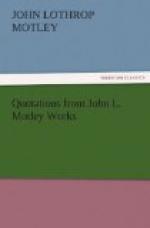of war
Only true religion
Only citadel against a tyrant and a conqueror was distrust
Only kept alive by milk, which he drank from a woman’s breast
Only foundation fit for history,—original contemporary document
Opening an abyss between government and people
Opposed the subjection of the magistracy by the priesthood
Oration, fertile in rhetoric and barren in facts
Orator was, however, delighted with his own performance
Others that do nothing, do all, and have all the thanks
Others go to battle, says the historian, these go to war
Our pot had not gone to the fire as often
Our mortal life is but a string of guesses at the future
Outdoing himself in dogmatism and inconsistency
Over excited, when his prejudices were roughly handled
Panegyrists of royal houses in the sixteenth century
Pardon for crimes already committed, or about to be committed
Pardon for murder, if not by poison, was cheaper
Partisans wanted not accommodation but victory
Party hatred was not yet glutted with the blood it had drunk
Passion is a bad schoolmistress for the memory
Past was once the Present, and once the Future
Pathetic dying words of Anne Boleyn
Patriotism seemed an unimaginable idea
Pauper client who dreamed of justice at the hands of law
Paving the way towards atheism (by toleration)
Paying their passage through, purgatory
Peace founded on the only secure basis, equality of strength
Peace was desirable, it might be more dangerous than war
Peace seemed only a process for arriving at war
Peace and quietness is brought into a most dangerous estate
Peace-at-any-price party
Peace, in reality, was war in its worst shape
Peace was unattainable, war was impossible, truce was inevitable
Peace would be destruction
Perfection of insolence
Perpetually dropping small innuendos like pebbles
Persons who discussed religious matters were to be put to death
Petty passion for contemptible details
Philip II. gave the world work enough
Philip of Macedon, who considered no city impregnable
Philip IV.
Philip, who did not often say a great deal in a few words
Picturesqueness of crime
Placid unconsciousness on his part of defeat
Plain enough that he is telling his own story
Planted the inquisition in the Netherlands
Played so long with other men’s characters and good name
Plea of infallibility and of authority soon becomes ridiculous
Plundering the country which they came to protect
Poisoning, for example, was absolved for eleven ducats
Pope excommunicated him as a heretic
Pope and emperor maintain both positions with equal logic
Portion of these revenues savoured much of black-mail
Possible to do, only because we see that it has been done
Pot-valiant hero
Power the poison of which it is so difficult to resist
Power to read and write helped the clergy to much wealth
Only true religion
Only citadel against a tyrant and a conqueror was distrust
Only kept alive by milk, which he drank from a woman’s breast
Only foundation fit for history,—original contemporary document
Opening an abyss between government and people
Opposed the subjection of the magistracy by the priesthood
Oration, fertile in rhetoric and barren in facts
Orator was, however, delighted with his own performance
Others that do nothing, do all, and have all the thanks
Others go to battle, says the historian, these go to war
Our pot had not gone to the fire as often
Our mortal life is but a string of guesses at the future
Outdoing himself in dogmatism and inconsistency
Over excited, when his prejudices were roughly handled
Panegyrists of royal houses in the sixteenth century
Pardon for crimes already committed, or about to be committed
Pardon for murder, if not by poison, was cheaper
Partisans wanted not accommodation but victory
Party hatred was not yet glutted with the blood it had drunk
Passion is a bad schoolmistress for the memory
Past was once the Present, and once the Future
Pathetic dying words of Anne Boleyn
Patriotism seemed an unimaginable idea
Pauper client who dreamed of justice at the hands of law
Paving the way towards atheism (by toleration)
Paying their passage through, purgatory
Peace founded on the only secure basis, equality of strength
Peace was desirable, it might be more dangerous than war
Peace seemed only a process for arriving at war
Peace and quietness is brought into a most dangerous estate
Peace-at-any-price party
Peace, in reality, was war in its worst shape
Peace was unattainable, war was impossible, truce was inevitable
Peace would be destruction
Perfection of insolence
Perpetually dropping small innuendos like pebbles
Persons who discussed religious matters were to be put to death
Petty passion for contemptible details
Philip II. gave the world work enough
Philip of Macedon, who considered no city impregnable
Philip IV.
Philip, who did not often say a great deal in a few words
Picturesqueness of crime
Placid unconsciousness on his part of defeat
Plain enough that he is telling his own story
Planted the inquisition in the Netherlands
Played so long with other men’s characters and good name
Plea of infallibility and of authority soon becomes ridiculous
Plundering the country which they came to protect
Poisoning, for example, was absolved for eleven ducats
Pope excommunicated him as a heretic
Pope and emperor maintain both positions with equal logic
Portion of these revenues savoured much of black-mail
Possible to do, only because we see that it has been done
Pot-valiant hero
Power the poison of which it is so difficult to resist
Power to read and write helped the clergy to much wealth




